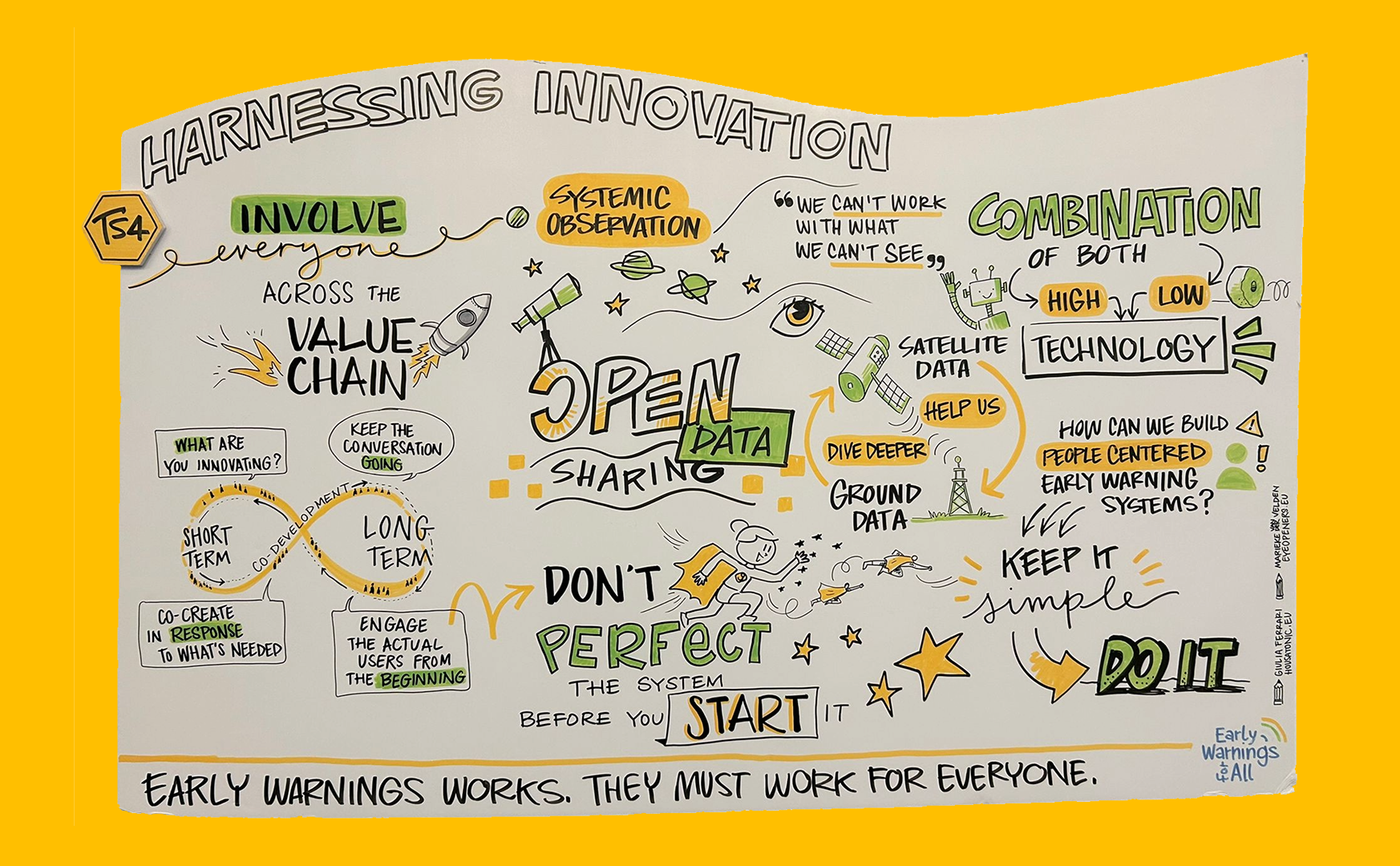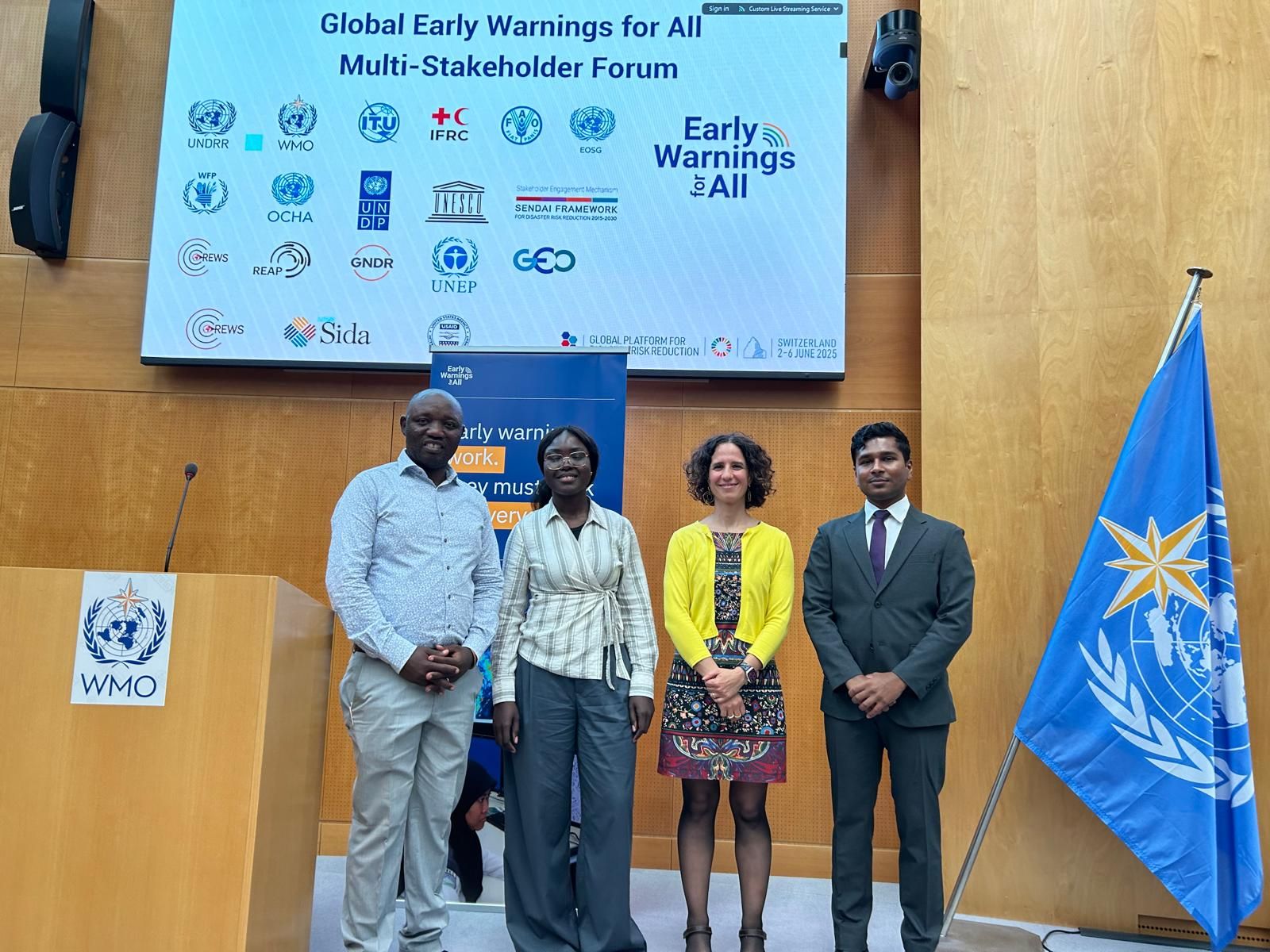Warnings, action and collaboration: GEO at the first EW4All Forum

Early warning systems only work when people at risk help shape them. That was the central message of the first Global EW4All Multi-Stakeholder Forum (EW4All MSF). (See outcome document)
Trust and action are built through co-development and co-ownership, supported by clear governance. These depend on open data, open knowledge, and open solutions that are accessible to all, principles GEO has championed for 20 years.
Held on the first day of GPDRR 2025, the EW4All MSF brought practitioners together to review progress and share lessons. As a supporting implementing partner of EW4All, GEO helped organize this segment, which featured a number of key GEO community speakers.

Thibyan Ibrahim: Policy and innovation through multilateral processes
Thibyan Ibrahim, from the government of the Maldives and representing the UNFCCC Technology Executive Committee (TEC), spoke as a SIDS negotiator and policy expert. He highlighted the policy brief co-developed by TEC and GEO on technology and innovation for EW4All. The brief stresses combining high- and low-tech, from AI and satellites to mobile phones and citizen science, to engage local stakeholders.
After negotiations at COP29, Parties to the UNFCCC adopted conclusions reflecting the brief’s recommendations. They acknowledged advances in technology, noted gaps in scaling solutions, and, crucially, encouraged support for open data, knowledge, and solutions that are openly available, accessible, and fit-for-purpose. This is essential for SIDS and other vulnerable countries striving to improve access to the resources they need most.
Sally Sampson: Mapping heat to empower communities
Contextualizing Thibyan’s presentation, Sally Sampson, a young scientist from Africa, brought the community perspective to life. She described working with community members in Kenya to map heat exposure in informal settlements using locally deployed sensors; those measurements fed exposure models and trained machine-learning tools to predict air temperatures in vulnerable neighborhoods.
Her example shows how members from vulnerable data-scarce communities can generate the data that underpins early warning and co-produce systems with governments, researchers and other stakeholders.
Inbal Becker-Reshef: Co-developing solutions for food security
Picking up on Sally’s point about multi-stakeholder engagement, Inbal Becker-Reshef of NASA Harvest stressed that co-development must include users across institutions and sectors. She called for transparency about model accuracy and proper validation as satellite and AI/ML capabilities expand and pointed to GEOGLAM’s Crop Monitor for Early Warning, a consensus product supporting countries facing food insecurity, as an example of early warning systems co-developed with the institutions that depend on them.
Innovation, she concluded, must be end-user driven, co-developed, and sustained, with open data, knowledge, and solutions at its core.
Charles Balagizi: Warnings in fragile contexts
Charles Balagizi, geochemist at the Goma Volcano Observatory and a leader in GEO’s GSNL flagship, spoke about the unique challenges of fragile and conflict-affected regions. In eastern Democratic Republic of Congo, the observatory lacks funding and proper infrastructure for the monitoring of active volcanoes and volcanic risk assessment, or even safe access to hazard zones.
Here, Earth observations are a lifeline: satellites can see where people cannot safely go or equipment is not deployed on the ground, and global collaboration helps fill capacity gaps .
Looking ahead
For GEO, the EW4All MSF was both a milestone and a motivation. The voices of Thibyan, Sally, Inbal and Charles showed that early warning systems succeed when they are co-developed with the people who use them, supported by open data, knowledge, and solutions, and sustained over time. This is the ethos GEO continues to carry forward: open, co-developed Earth intelligence for all.
The authors wish to thank the lead organizers of the EW4All MSF and the co-organizers of thematic sessions 2 and 4 — especially Anna Kruip, Carlyne Yu, and Alon Sidel (UNDRR); Muhibuddin Usamah (WMO); Doris Maritza Delgado (ITU); and Ioana Creitaru (UNDP) — for giving GEO the opportunity to be part of this important event as family. We also extend our heartfelt thanks to Maia Tskhvaradze (UNFCCC Secretariat) for her support to Thibyan. Huge thanks to Ben Webster, Gavin White, and Antonia Kreissl (REAP Secretariat) for making Sally’s participation possible through the EWEA Travel Bursary and for financing the visual summaries. Special thanks also go to Nicera Wanjiru (CommunityMapper) and Monika Kuffer (University of Twente) for their generous support to Sally.